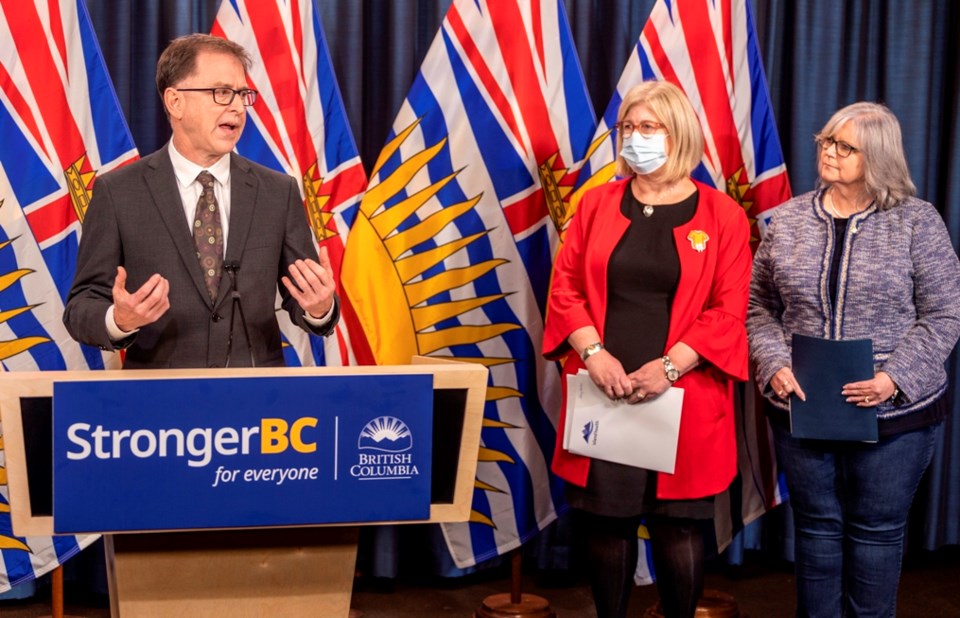Port Hardy and Cormorant Hospital emergency departments will remain closed overnight until more resources are secured and services improved with $30 million in new operating and capital funding, Health Minister Adrian Dix said Friday.
Port McNeill Hospital, about 40 kilometres from Port Hardy, will remain the only acute-care hospital ER in the region open 24 hours a day.
Emergency-department services will be available from 7 a.m. to 5 p.m. in Port Hardy, from 8 a.m. to 7 p.m. on Cormorant Island, and 24 hours a day, seven days a week in Port McNeill.
Regular hours will be restored as soon as staffing is sufficient, but having set hours in the meantime will stabilize the situation and let patients and families know where and when emergency services are available, Dix said.
“We believe in these three hospitals, we believe that they have a powerful future, we are investing in that future capital and staffing resources and more services,” Dix said at a news conference Friday at the B.C. legislature, adding the ministry and health authority’s main goal is to bump up staffing.
In the meantime, the Health Ministry is committing $30 million in capital and operating funding to the Mount Waddington region.
Some of the money will be used for a daily shuttle between Port Hardy and Port McNeill hospitals, as well as daily shuttles to Campbell River and the Comox Valley for patients and staff, although drivers still need to be hired and trained.
The plan also includes deploying mobile computed tomography (CT) diagnostic services to the region and expanding staffing at Port Hardy Hospital.
The hiring of two new physicians in Port McNeill last year eased shortages there, but Port Hardy’s emergency department has lost physicians, resulting in increasing overnight and weekend closures — the ER has been closed 25 per cent of the time since October. Cormorant Hospital in Alert Bay has seen similar overnight closures.
Port Alice, which is also in the region, has an urgent care centre.
Island Health CEO Kathy MacNeil said the health authority made the difficult decision to close Port Hardy and Cormorant hospitals overnight to provide certainty for residents of the area.
“We have heard the community loud and clear — people need to know when services are available and when they are not,” MacNeil said. “To the local communities and First Nations, I want you to know that this is an incredibly hard step for Island Health to take. However, we know [with] this temporary decision, supported by the additional actions implemented that are starting today, we will be positioned to be better able to meet your needs in the future.”
The temporary closure will allow Island Health to work on upgrading facilities and recruiting staff, said MacNeil. “We’ll have housing that [staff] will want to live in and we’ll be able to retain a health-care workforce there that is stable and safe for the longer term.”
Staffing levels need to reach 80 per cent of the recommended level before the ER can be reopened overnight, she said. Port Hardy’s ER, for instance, now has 3.5 doctors, while a full staff complement is seven.
Last week, Port Hardy physician Dr. Alex Nataros said as of July 1, he will become the only ER doctor in the town of 4,000. Two physicians are scheduled to leave over the next few months.
Nataros, in an interview Friday, said funding to support more hiring of nurses is critical, and clarifying operating hours is better than the last-minute closure announcements from the health authority that have become the norm. The promise of a new mobile CT scanner is also helpful, he said.
“But the big picture, from my perspective, is that this doesn’t do anything to address [immediate] medical staff challenges, right?” said Nataros. “It’s sort of like buying airplanes but not hiring pilots.”
MacNeil said the $30 million from the Health Ministry will pay for, among other things, recruitment incentives for eligible staff (about $2,000 in quarterly incentives), as well as $1,500 bonuses for referring physicians to the region, and time-and-a-half plus meals and mileage for those who travel to fill shifts.
The funding will also provide for 10 additional protection service officers to improve safety, and upgraded accommodations for travelling staff, which Dix said is a huge part of attracting and retaining doctors and nurses to the area.
“These are the strongest incentives we can provide,” said Dix. “It’s an ambitious plan and the right response.”
Island Health said it will also add new 24/7 mental health and substance-use services, such as additional sobering and assessment centre beds, to increase access to supportive care and reduce emergency department admissions.
Additional long-term-care beds are also being established in Port Hardy to ease pressure on hospital beds.
There’s also a plan to upgrade the Port McNeill and Port Hardy hospitals by renovating existing spaces, including the maternity, emergency departments, trauma and nurses’ stations.
North Island MLA Michele Babchuk said the government is providing the stability and funding the multi-pronged approach residents and staff want.
Babchuk maintains the actions announced Friday will address immediate challenges in the area and start the work of modernizing and improving health care for north Island residents for years to come.



